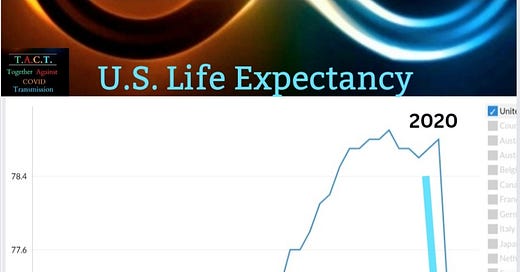COVID Accelerated Aging
Epigenetic Age is a measure of our age at the cellular & DNA level.
Everyone ages at different speeds based on the damage to our cells and DNA over time.
Damage occurs from viruses and can be more damaging if the virus persists.
(ex. EBV, HPV, Varicella, HIV, and COVID)
Viruses that evade antibodies can infect more cells with greater ease.
Virus-infected cells must be eliminated by CD8 T-cells so more cells are lost.
The more cells that are eliminated, the more cells have to divide to replace them.
Genetic mutations are changes to your DNA sequence that happen during cell division when your cells make copies of themselves.
COVID is accelerating aging on various epigenetic clocks, 5 to 10 years.
COVID causes massive cell loss and cell division which could increase DNA mutation, and together are accelerating biological aging.
Hypothesis: Taking pharmaceutical drugs while undergoing massive cell loss and cell division could increase DNA mutation, leading to increased accelerated aging.
American life expectancy is now at its lowest in nearly two decades "It's rare to see such big changes in life span year to year, but the pandemic claimed nearly 417,000 lives last year, making COVD the 3rd leading cause of death for the 2nd year."(6)
As we age, we have more and more birthdays, and as the numbers go up, the number of years left to live goes down. This is how old we are in years, our chronological age.
American life expectancy is now at its lowest in nearly two decades "It's rare to see such big changes in life span year to year, but the pandemic claimed nearly 417,000 lives last year, making COVD the 3rd leading cause of death for the 2nd year."(6)
Most people know that as we get older, our chances of getting sick from a virus, bacteria, mold, or fungus (collectively called "pathogens") go up with each year that passes. When we look more closely, we can see that everyone ages at a different rate, based on how much damage our cells and DNA have been through. This is our biological age. The term used when trying to figure out our biological age, is epigenetic age. The word "epigenetics" comes from the Greek word "epi," which means "over" or "above." In this case, the word "epi" refers to the genome. This field of study tries to figure out how our actions and the environment can change the way our genes work. What we eat, how much we sleep, how much we exercise, whether or not we smoke, and how much alcohol we drink can all change the composition and location of chemical groups that bind to our DNA. Our chronological age is based on when we were born, but our biological age is based on how old our cells, tissues, and organ systems seem to be based on how they work. Over time, our experiences and environment change our epigenome, just like the rings on the inside of a tree show how old it is and where it has been damaged or stressed by things like drought or fire.
Viral infections that get past antibodies are particularly costly. COVID can infect a wide variety of cell types, including our immune cells. Every viral particle that gets into us, has to infect one of our cells before T-cells recognize that it must be eliminated. Since T-cells can also get infected, the ones that don’t are also killing our immune system to prevent the virus from circulating in our blood. The more viral particles someone is exposed to, the greater the number of our cells that will have to die.
To replace those cells, the ones that weren’t infected, divide to rebuild the population until we are back to optimal levels. A problem is that the vast majority of cells can only divide a finite number of times. One of the ways to detect cellular aging is by measuring telomeres. These are on every cell. They become shorter with each cell division until the cell can no longer divide.
A side note for women is that women produce more naive T-cells before puberty, and women have longer telomeres than men. Both of these show why women tend to outlive men from a cellular perspective. “The fact that COVID-19 female patients had longer telomeres than men patients at different age ranges is in line with the fact that female COVID-19 patients show a lower mortality than males” (2)
"One mechanism of aging is the progressive shortening of telomeres, which are protective structures at chromosome ends." "Critically short telomeres impair the regenerative capacity of tissues and trigger loss of tissue homeostasis and disease." (1)
"Continuous immune reactions cause progressive telomerase inactivation leading to telomere shortening, which occurs when cells stop dividing and replicative senescence occurs." (2)
Keep reading with a 7-day free trial
Subscribe to T.A.C.T. to keep reading this post and get 7 days of free access to the full post archives.





